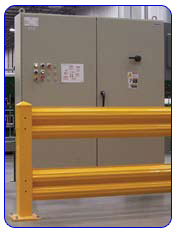|
 Highway Guardrails Highway Guardrails
They are as common as billboards but equally important to motorists' safety as the seat belts they wear. They are universally unnoticed but quietly protect the traveling public.
Why Highway Guardrails are Necessary
A Guardrail is something most people take for granted until it saves their lives. Annually between 6,000,000 – 7,000,000 people in the U.S. are involved in highway or roadway accidents. The results are between 3,000,000 – 4,000,000 injuries and more than 40,000 fatalities (source: Federal Highway Administration). Guardrails are a major reason many people survive some of these accidents.
Roadside safety devices, including guardrails, keep motor vehicles from striking other objects such as pillars, bridges, trees or on-coming traffic. According to the Federal Highway Administration (FHWA), crashes involving running off the road are a factor in more than one-third of the nation’s traffic fatalities. The fatality rate would be higher were it not for Highway Guardrail systems which have significantly improved and enhanced traffic safety. The numerous examples of marred and damaged guardrails along our roads are evidence of crashes that could have been much more damaging and serious.
Since 1998, new performance standards for roadside safety devices, including Highway Guardrails, became effective. As a result, road safety for all varieties of vehicles has improved, including pickups, minivans and sport utility vehicles. The implementation of these new performance standards was part of an overall FHWA safety program to reduce the number and severity of run-off-the-road crashes through better designed and installed guardrails.
Many tests have been performed to analyzeguardrails under crash conditions. Researchers evaluated the deformation behaviors of guardrails under both static and impact transverse loads. The goal was to measure the energy absorption contribution of each kind of deformation. Different geometries and loads were studied. The result was a better and safer guardrail for the United States.
Where Highway GuardrailsShould Be Installed
Our guardrails can be installed on all types of roadways and include interstates, highways and secondary roads. These valuable protective devices shield vehicles from all types of natural and man-made roadside hazards that are difficult or expensive to remove or modify. These hazards include cliffs and drop-offs, pillars, trees, ditches, utility poles and signs.
Guardrails are a lifesaving shield when installed on bridges. Protection is provided along and most importantly, at the ends of the bridges. In addition, areas below the bridge, such as rivers, railroad tracks and other roads, are protected from off-road vehicle impact.
Guardrails are ideally suited for Parking Lot protection. They shield against such vehicle hazards as light poles, ditches and buildings. Guardrails also provide addition security against auto theft in parking lots.
Our Highway Guardrails use heavy gauge industrial steel and are designed, engineered, and manufactured to the highest industry standards. We recommend the use of the W-Beam guard rail for most situations. It is an optimal choice for vehicle and occupant safety, durability, strength and cost effectiveness. Our Highway Guardrails are manufactured from industrial high-strength 12 gauge (Class A) or 10 gauge (Class B) steel and coated in rust-resistant zinc. Our W-Beam guardrails are available in standard 25' and 12' 6" lengths.

XPB Lockers carries a wide variety commercial industrial sinks, commercial mailboxes, commercial outdoor furniture, bleachers, and commercial signage delivered nationwide. If you can not find what you are looking for call us toll free at 1-877-483-9270 and we will find it for you. Our home office is located in New Braunfels, Texas with warehouses located throughout the United States that enable us to service all 50 states including New Orleans, La., Cleveland, Ohio, Kansas City, Mo., Mesa, Arizona, Virginia Beach, Va., Omaha, Nebraska, Oakland, California, Miami, Florida, Tulsa, Oklahoma, Minneapolis, Minnesota, Colorado Springs, Colorado, Houston, TX, Arlington, Texas, Beaumont, Texas, Denton, TX, McKinney, Texas, Midland, TX, Killeen, Texas, ALBQ, NYC, LA, MPLS.
|

